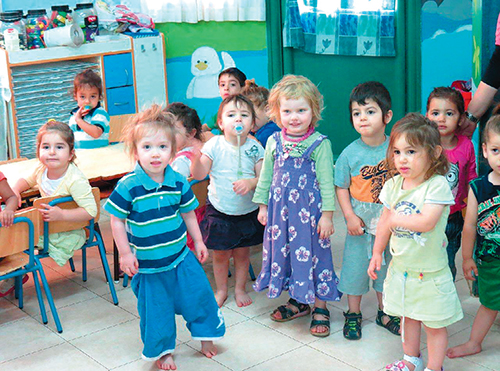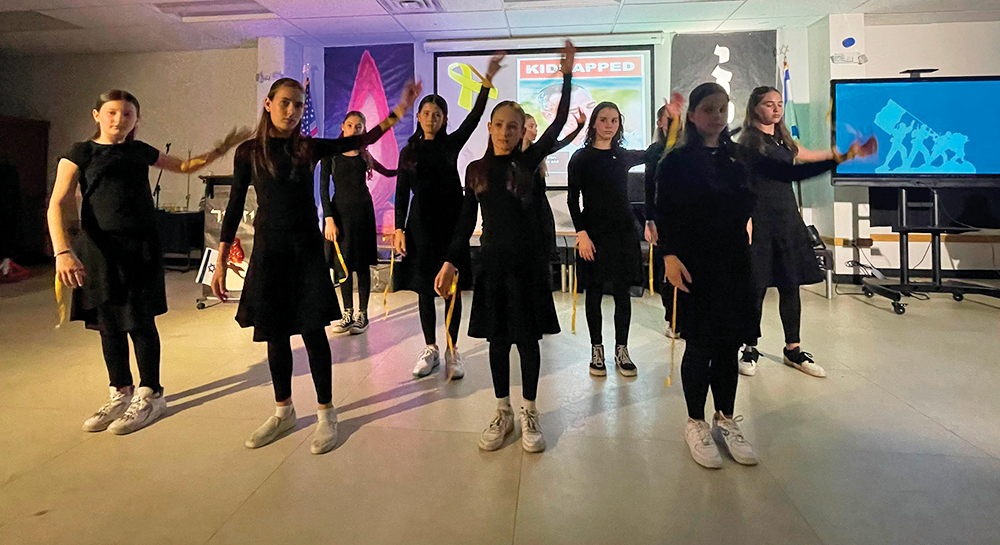


Migdal Ohr, the Israeli organization founded by Israel Prize winner Rabbi Yitzchak Dovid Grossman to bring essential services and loving care to Israel’s most impoverished children, has a new executive in its American office. Norman Gildin, a 30- year Teaneck veteran now serves as executive vice president of the American Friends of Migdal Ohr
The Migdal Ohr organization and its origins are today the stuff of legend. Moving to the small northern Israeli town of Migdal Ha’Emek in 1968, the young Rabbi Grossman sought to help people who were in trouble.
“I wanted to find a place where I could really make a difference, because Jerusalem was filled with enough rabbis and they didn’t need me,” Grossman told JLBC’s Jeanette Friedman. “I decided that if I wanted to affect change, I would have to start with the youngsters. When I asked where they were, I was told I would find them at the local discotheque,” he said. He went to the discos and bentched Chanukah candles with young adults who had no connection to Yiddishkeit…and soon they began to call him the “Disco Rabbi!” In the beginning, it was his claim to fame., and made it possible for him to make a difference for the good in tens of thousands of lives.
Reb Dovid’s heart and home was open to them and he was able to understand something of what they were going through. Because he felt close to these impoverished children, he took them to visit their family members in jail, and concluded that the reason those persons were incarcerated was because “no one had ever given them proper love, care, and education.”
It occurred to Grossman, after working with the jail population for several years, that it was in some ways too late for him to help them. But he had a kind of epiphany. “If you can get to these kids before they are damaged, you are ahead of the game,” he told Friedman.
In 1970, Grossman had 17 students in a fledgling school for troubled children. He named the school Migdal Ohr—tower of light. That year, a couple from Weehawken, New Jersey—Jack, z”l, and Belle Rosenbaum (now living in Monsey), came to Jerusalem so Jack could study with Rabbi Grossman’s father. They soon learned about his son and his work with Migdal Ohr in the north.
The Rosenbaums were so impressed with Migdal Ohr that they brought Rabbi Grossman to the States in 1971. Grossman went home with $30,000 and began working in earnest. He has never stopped. Forty years later, Migdal Ohr has 14 schools on three campuses and serves 6,500 children a year. These are abandoned children, orphans, abused children, and children from broken homes. More than half live in dormitories and are between the ages of 10 and 18. More children are bussed in daily for classes.
Rabbi Grossman today remains the Chief Rabbi of Migdal Ha’Emek and was the recipient of the Israel Prize in 2004. Taking on the mission to raise funds for Migdal Ohr is something Norman Gildin is looking forward to. “Migdal Ohr has touched the soul of Israel,” said Gildin. “This is sacred work; these children must be made to feel valued,” he said.
Gildin spoke with JLBC about joining Migdal Ohr, and shared some of his views about the organization and his belief in the cause.
“Rabbi Grossman is an amazing individual,” said Gildin. “He’s someone who has had a national impact and changed the landscape of Israel for the better. He is there to provide the hope, the joy, the encouragement, and services—to give the children a sense of purpose and accomplishment, so they aren’t roaming the streets, so they aren’t abandoned,” he said.
Gildin’s current trip to Israel is set to take him from east to west and north to south, to see the 160 youth clubs that Migdal Ohr today sponsors throughout Israel, which reach 7,000 children each week. The clubs serve children, teens at risk, the Zoharim program, and also alumni of Migdal Ohr, to make sure their needs are taken care of as well. There are 15,000 graduates of the Migdal Ohr program estimated to be living in Israel today—upstanding, useful members of society. They are doctors, lawyers, generals, rabbis, fashion designers, computer geeks, and parents. Eighty percent of Migdal Ohr’s graduates go on to higher education.
Gildin brings more than 25 years of fundraising expertise to American Friends of Migdal Ohr. He was most recently president of his own consulting firm, Strategic Fundraising Group. Previously, he was the Chief Development Officer at OHEL Children’s Home and Family Services, and also served as the Executive Director/Chief Development Officer for the Metropolitan Jewish Geriatric Foundation.
Gildin and his wife Barbara have lived in Teaneck for 30 years. They are members at Teaneck Congregations Beth Aaron, Zichron Mordechai, and Rinat Israel. Gildin serves with his wife on the Chevra Kadisha. The Gildins have five children, three of whom having given back to their community by serving on the Teaneck Volunteer Ambulance Corps.
Gildin said he is looking forward to this new chapter with American Friends of Migdal Ohr. “Migdal Ohr has an international reputation serving impoverished children, or those who have had a disadvantaged background, in Israel. Israel, to a great extent, is an extension of all of our communities. What happens in Israel affects us here,” he said.
With the cause set firmly in place, Gildin turned to the difficult talk of how to raise money when there is so much competition for American tzedakah dollars.
“One of the strengths that I bring to Migdal Ohr is that I am a strategic planner. It is important to have a blueprint for fundraising, but it has to be fluid,” he said. “For example, we have to be involved in social media, to reach out to millennials, because this is what the millennial generation is using to stay connected to Migdal Ohr,” he said. “But there is still no substitute for person-to-person contact. The most important thing is keeping a close relationship with the donor. We plan to have continuing contact on an ongoing basis,” he said.
By Elizabeth Kratz













